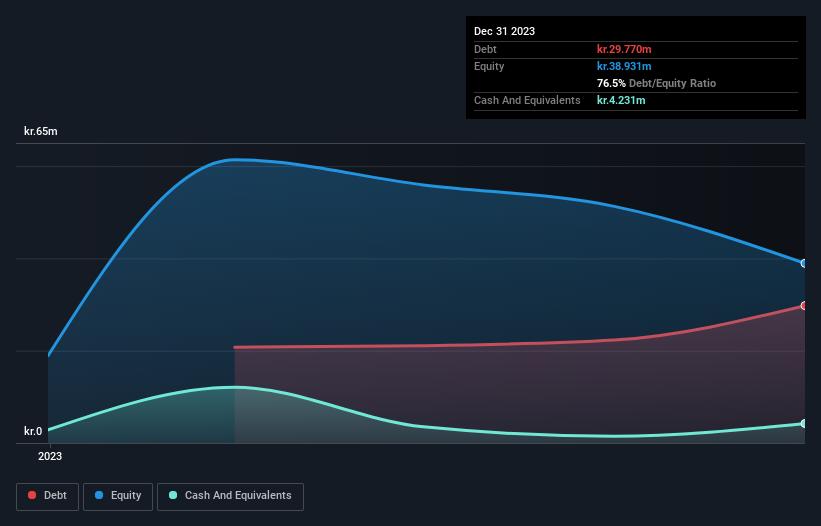
Howard Marks put it nicely when he said that, rather than worrying about share price volatility, 'The possibility of permanent loss is the risk I worry about... and every practical investor I know worries about.' So it seems the smart money knows that debt - which is usually involved in bankruptcies - is a very important factor, when you assess how risky a company is. As with many other companies Pharma Equity Group A/S (CPH:PEG) makes use of debt. But the real question is whether this debt is making the company risky.
When Is Debt A Problem?
Debt assists a business until the business has trouble paying it off, either with new capital or with free cash flow. Ultimately, if the company can't fulfill its legal obligations to repay debt, shareholders could walk away with nothing. However, a more frequent (but still costly) occurrence is where a company must issue shares at bargain-basement prices, permanently diluting shareholders, just to shore up its balance sheet. By replacing dilution, though, debt can be an extremely good tool for businesses that need capital to invest in growth at high rates of return. The first thing to do when considering how much debt a business uses is to look at its cash and debt together.
View our latest analysis for Pharma Equity Group
What Is Pharma Equity Group's Net Debt?
You can click the graphic below for the historical numbers, but it shows that as of December 2023 Pharma Equity Group had kr.29.8m of debt, an increase on none, over one year. However, it also had kr.4.23m in cash, and so its net debt is kr.25.5m.

How Strong Is Pharma Equity Group's Balance Sheet?
The latest balance sheet data shows that Pharma Equity Group had liabilities of kr.34.3m due within a year, and liabilities of kr.8.07m falling due after that. On the other hand, it had cash of kr.4.23m and kr.62.6m worth of receivables due within a year. So it can boast kr.24.4m more liquid assets than total liabilities.
This short term liquidity is a sign that Pharma Equity Group could probably pay off its debt with ease, as its balance sheet is far from stretched. When analysing debt levels, the balance sheet is the obvious place to start. But it is Pharma Equity Group's earnings that will influence how the balance sheet holds up in the future. So if you're keen to discover more about its earnings, it might be worth checking out this graph of its long term earnings trend.
Given it has no significant operating revenue at the moment, shareholders will be hoping Pharma Equity Group can make progress and gain better traction for the business, before it runs low on cash.
Caveat Emptor
Importantly, Pharma Equity Group had an earnings before interest and tax (EBIT) loss over the last year. To be specific the EBIT loss came in at kr.25m. Looking on the brighter side, the business has adequate liquid assets, which give it time to grow and develop before its debt becomes a near-term issue. Still, we'd be more encouraged to study the business in depth if it already had some free cash flow. So it seems too risky for our taste. The balance sheet is clearly the area to focus on when you are analysing debt. But ultimately, every company can contain risks that exist outside of the balance sheet. Case in point: We've spotted 4 warning signs for Pharma Equity Group you should be aware of, and 1 of them is significant.
If you're interested in investing in businesses that can grow profits without the burden of debt, then check out this free list of growing businesses that have net cash on the balance sheet.
If you're looking to trade Pharma Equity Group, open an account with the lowest-cost platform trusted by professionals, Interactive Brokers.
With clients in over 200 countries and territories, and access to 160 markets, IBKR lets you trade stocks, options, futures, forex, bonds and funds from a single integrated account.
Enjoy no hidden fees, no account minimums, and FX conversion rates as low as 0.03%, far better than what most brokers offer.
Sponsored ContentNew: Manage All Your Stock Portfolios in One Place
We've created the ultimate portfolio companion for stock investors, and it's free.
• Connect an unlimited number of Portfolios and see your total in one currency
• Be alerted to new Warning Signs or Risks via email or mobile
• Track the Fair Value of your stocks
Have feedback on this article? Concerned about the content? Get in touch with us directly. Alternatively, email editorial-team (at) simplywallst.com.
This article by Simply Wall St is general in nature. We provide commentary based on historical data and analyst forecasts only using an unbiased methodology and our articles are not intended to be financial advice. It does not constitute a recommendation to buy or sell any stock, and does not take account of your objectives, or your financial situation. We aim to bring you long-term focused analysis driven by fundamental data. Note that our analysis may not factor in the latest price-sensitive company announcements or qualitative material. Simply Wall St has no position in any stocks mentioned.
About CPSE:PEG
Pharma Equity Group
Through its subsidiary, Reponex Pharmaceuticals A/S, a clinical-stage biopharmaceutical company, develops treatments for diseases that have patient and social impact for which current therapy is lacking or in need of improvement.
Moderate with mediocre balance sheet.
Market Insights
Community Narratives



